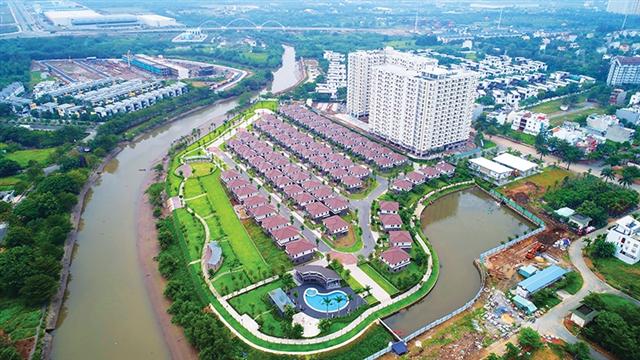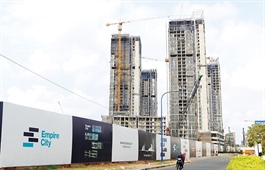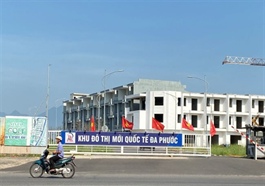M&A offers solution for developers in pandemic
M&A offers solution for developers in pandemic
Despite merger and acquisition activities emerging as an answer for many real estate developers to mobilise cash to restructure their portfolios, valuations remain a sticking point among partners.

To prepare for its development plans, Nam Long Group has acquired a large land fund of more than 680ha. Photo: Le Toan
|
In the first seven months, many real estate developers have been in shortage of capital resources due to the low liquidity caused by COVID-19 and tightened credit from bankers, while legal procedures have ground almost to a halt. As a result, partly selling shares is becoming the direction for such developers to mobilise finance.
Quoc Cuong Gia Lai JSC has divested 99.9 per cent of its shares from the Song Da Riverside project and 49.9 per cent of Song Ma Real Estate Company. The transactions have brought about more than VND556 billion ($24 million) for Quoc Cuong Gia Lai and helped the company increase its revenues in 2020 so far, four times higher than in the same period of last year.
The first seven months was also an active period for LDG Group, as it continues selling shares in a range of companies. LDG sold 7.2 million shares in Gia Loc Construction and Investment Company and 99.9 per cent in Binh Nguyen Real Estate JSC. The two transactions have gathered VND832 billion ($35.9 million) for LDG Group to implement other projects which are in need of capital.
Le Hoang Chau, chairman of the Ho Chi Minh Real Estate Association said that mergers and acquisitions (M&A) were strong among real estate developers in recent times. “Transactions are a good method for the market, which can help some developers get rid of distressed assets and restructure their portfolios, while others can have new investments,” Chau said.
Those transactions also help reduce stockpiles in the market and increase market liquidity as well, Chau added.
Nguyen Quoc Bao, deputy general director of Danh Khoi Real Estate JSC, said that via M&A transactions, developers and companies have saved time and energy in completing procedures and legal documents to have clear land for project development. “Successful deals are helping developers shorten down their time required for project development and is a win-win case for involved partners,” said Bao.
Expanding land funds
While some developers are divesting from projects and companies to gather finance, others are actively collecting more land plots.
Nam Long Group has prepared and collected a large land fund for its future development. According to the group’s chairman Nguyen Xuan Quang, Nam Long now has a land fund of more than 680 hectares of clear land in major real estate destinations in Vietnam. Nam Long also recently acquired three large scale projects with total of 240 hectares involving The Waterfront in Long An province, Dai Phuoc in Dong Nai province, and Nam Long Haiphong.
“We strongly believe that COVID-19 cannot hinder Nam Long in its road to become a billion-dollar developer by 2022. We have also consulted with McKinsey & Company to set up a development vision for the next decade,” Quang said. “We are also ready to acquire a large-scale land fund which can be utilised for urban development areas to expand our portfolio.”
Meanwhile, Novaland continues to focus on developing three key product lines in the medium- and high-end segments based on its current land bank of nearly 5,000ha. These include residential projects in central Ho Chi Minh City, a satellite township project in Dong Nai, and second-home projects in some key tourism destinations. This land bank will secure the growth of Novaland for the next 10-15 years.
An Gia Real Estate Investment and Development Corporation has also been expanding its current land fund with a reservation from VND3-5 trillion ($130-215 million) for acquiring land plots. Apart from the key market of Ho Chi Minh City, An Gia is expanding to neighbouring provinces such as Dong Nai, Long An, Ba Ria-Vung Tau, and Binh Duong.
According to Ngo Duc Son, deputy general director of DRH Holdings, companies must prepare land plots in order to be active in implementing their investment plan for the coming time. “Land is now the critical factor for real estate developers to do business. Therefore getting more land fund means that the future development plan can be ensured at higher efficiencies,” Son said.
Tricky asset valuations
Asset valuation is the most important issue to decide the success of any M&A deal, experts say – however, there is often a big gap among partners when it comes to such decisions.
International valuation firms are always selected to comment on the market value of assets in transactions involving foreign elements. However, there may be differences between the market, the investment, and the liquidation value of the asset. In order to make the most appropriate judgment about the value of an asset, appraisers must have accurate and transparent information about the assets to base on for further consideration.
According to Peter Sorensen, managing director of ABB Merchant Banking, when negotiating there are some factors for real estate valuation, such as a good track record. Buyers and sellers will normally have different perspectives on the commercial advantage of a certain project.
The difference in opinion between the seller and the buyer in the valuation is partly leading to the failure of a transaction. This is important for companies which are operating real estate projects as non-core investment, according to Sorensen. While the buyer may consider the assets on offer as an inactive asset, the seller meanwhile sees it as a project with great potential.
“The key factors for real estate asset valuation are the profitability potential compared with investors’ cost and other equal values in the region. In addition, major factors such as location and the right for choosing are valid factors,” added Sorensen.
Meanwhile Nguyen Khanh, senior director for capital market of JLL Vietnam, said that after the first step of choosing the right buyer and seller, the next step is to narrow the price gap between the two sides.
“Buyers often expect that the transaction prices could able to fulfil their profitability requirements, while sellers often have high expectations on their assets. A good consultant will need to demonstrate extensive market knowledge and experience to match both sides at a mutually beneficial price,” Khanh said.
With a fluctuating real estate market, the definition of assets has become important. However, valuation now faces risks such as lack of databases and inefficient implementation of zoning plans.
The government has been improving land and database storage through a project funded by the World Bank. However this database will not be completed this year. Ineffective planning management has led to market value disturbance, thereby making market information inconsistent. This is particularly important, as land use planning is often not publicly accessible.
























